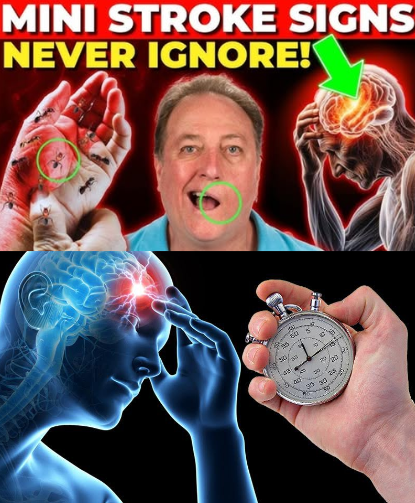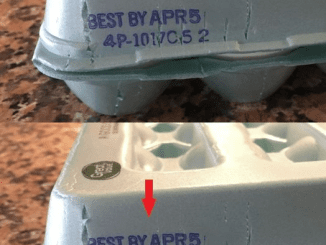
Your Body Might Be Whispering a Warning—Are You Listening?
A stroke rarely arrives without warning. Often, your body sends subtle signals—sometimes even a month in advance. But the problem? Most of us dismiss them. We blame stress, exhaustion, or age. But some of these quiet symptoms could be your brain’s way of saying, “Help me.”
Let’s explore 10 early warning signs that could save your life—or someone else’s—if caught in time.
Frequent Headaches That Won’t Quit
Sure, everyone gets headaches. But if they suddenly become more frequent or unusually intense—and especially if they’re paired with dizziness or confusion—it could be a red flag.
When blood flow to the brain is restricted, pressure can build, causing pain and even swelling. These headaches aren’t “just migraines.” They’re a sign something serious might be brewing.
Sudden Vision Problems
Ever get blurred or double vision without warning? Or maybe you briefly lose sight in one eye?
These changes in eyesight could be the result of decreased blood supply to the part of your brain that controls vision. If your vision suddenly shifts, especially in one eye, don’t wait. Your eyes are telling you your brain is in trouble.
Unexpected Dizziness or Loss of Balance
Feeling off-balance or lightheaded isn’t always due to dehydration or hunger. When the brain isn’t getting enough oxygen-rich blood, it can mess with your sense of equilibrium.
If you stumble more often or feel like the room’s spinning, it could signal a circulatory issue in your brain. Don’t just chalk it up to being tired.
Tingling or Numbness on One Side of the Body
Ever notice a strange sensation—like tingling, numbness, or weakness—on one side of your face, arm, or leg?
That’s a classic stroke precursor. Strokes often affect just one side of the brain, and the symptoms show up on the opposite side of the body. If one side suddenly feels “off,” take it seriously.
Unexplained Fatigue or Weakness
Not all fatigue is just from lack of sleep. If you feel physically drained or mentally sluggish without a clear reason, your brain could be struggling to get the oxygen it needs.
This kind of fatigue may creep up slowly, making it easy to overlook. But don’t dismiss it if it lingers or worsens over time.
Memory Lapses or Mental Fog
We all misplace our keys or forget names sometimes. But frequent memory gaps, trouble focusing, or feeling like your mind is in a fog can signal brain function impairment.
If you’re spacing out more than usual or feel “off,” your brain may be under stress—possibly from reduced blood flow.
Video : 10 Warning Signs of Stroke One Month Before!
Difficulty Swallowing (Dysphagia)
Swallowing isn’t something we think about—until it becomes difficult. If food or drinks suddenly seem harder to swallow, it might indicate that the muscles involved in this action are not getting clear signals from the brain.
Even a small change like this can be a major red flag when tied to other symptoms.
High Blood Pressure and Chest Pain
Persistent high blood pressure is a huge risk factor for strokes. When combined with chest discomfort or irregular heartbeats, it can spell trouble.
Chest pain doesn’t always mean a heart attack. Sometimes, it’s your cardiovascular system reacting to narrowing arteries that could eventually trigger a stroke.
Mood Swings or Sudden Personality Changes
Feeling more irritable, anxious, or emotionally volatile without a known cause? Personality changes can be the result of shifts in brain chemistry or oxygen flow.
If someone close to you suddenly seems like a different person—especially if they also have other symptoms on this list—don’t ignore the change.
Slurred Speech or Difficulty Understanding Others
One of the most obvious signs of a stroke—or one on the horizon—is slurred speech or trouble speaking. But here’s the thing: these episodes don’t always stick around.
You might have a brief moment of tongue-tied speech, confusion when choosing words, or trouble understanding someone else. Even if it only lasts a few seconds, it could mean a mini-stroke (also called a TIA).
What Should You Do If You Notice These Signs?
Act fast. Don’t Google it. Don’t wait it out. Call emergency services or visit the ER.
Even if the symptoms fade, they could be a warning shot—your only chance to prevent a full-blown stroke.
If you’re supporting a loved one and notice these symptoms, don’t second-guess. Better to be wrong and safe than too late.
Video : 10 Warning Signs of Stroke One Month Before It Happens | VisitJoy
Final Thoughts: Know the Signs, Save a Life
A stroke doesn’t always hit like lightning. Sometimes, it creeps in with whispers—numb fingers, tired eyes, clumsy moments. But if you pay attention, those whispers can speak volumes.
By staying aware of these early warning signs, you give yourself or someone you love a powerful head start. A few minutes of awareness could mean a lifetime of difference.
So ask yourself: are you listening to your body’s quiet signals? Or waiting until it screams?


